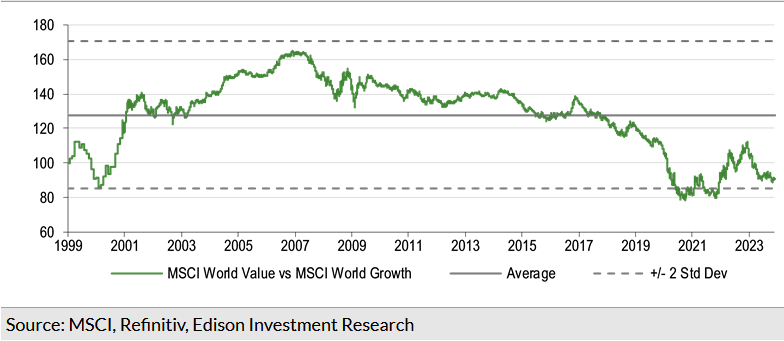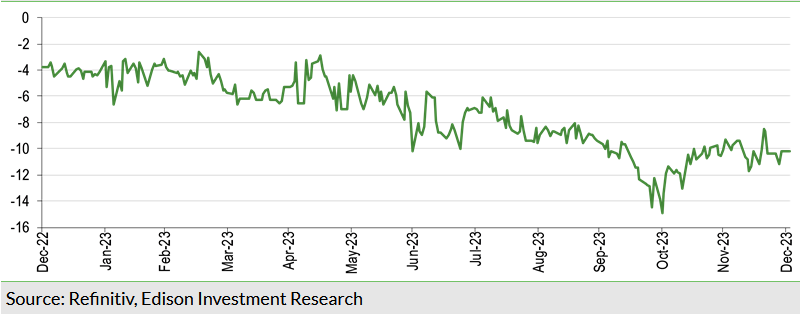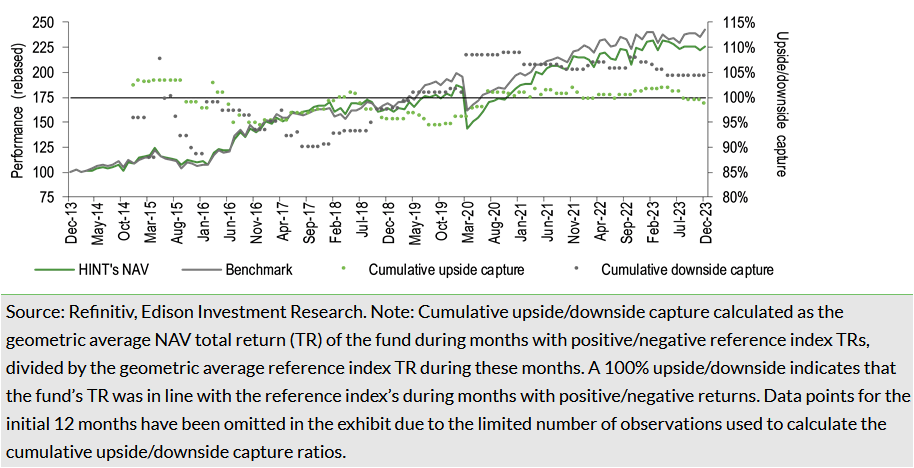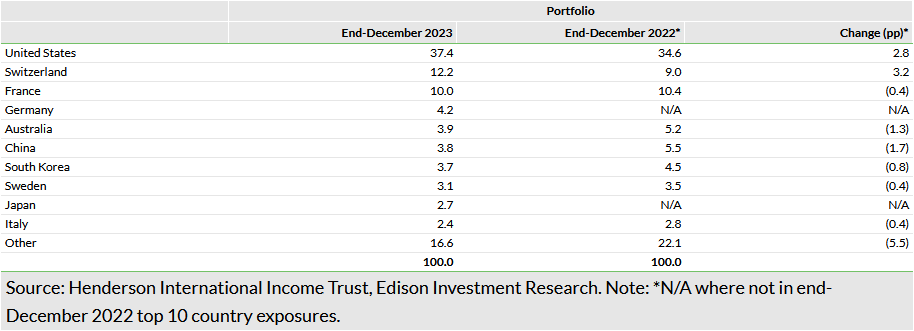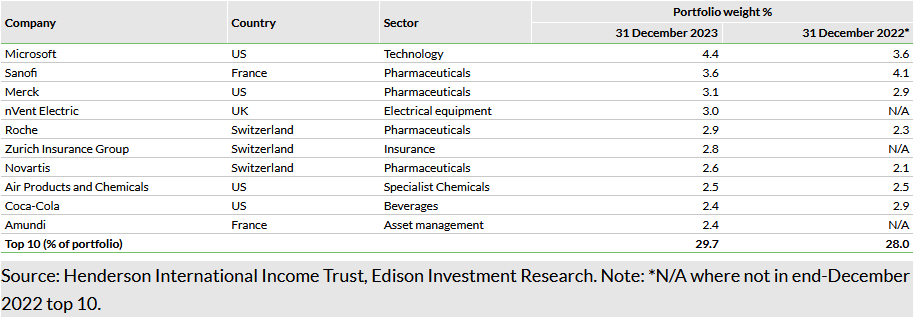
Nonetheless, HINT’s annual dividend increased in FY23 to 7.47p, a 3% rise on the 7.25p paid in the previous year. This increase, which was funded in small part by reserves, extends the company’s track record of annual dividend increases. It comprised three quarterly dividend payments of 1.85p and a fourth dividend of 1.92p, which was paid on 30 November 2023. This puts HINT’s current dividend yield at 4.7%, currently the highest within its AIC Global Equity Income peer group (Exhibit 2), while Janus Henderson estimates the company’s forward dividend yield at 4.3% for the first half of calendar 2023, based on 12-month forward data.
The increase in HINT’s fourth interim dividend for FY23 also bodes well for its potential dividend payment in FY24. If past dividend payments are any guide, the first three dividend payments for FY24, beginning 1 September 2023, will each total 1.92p, the same as the fourth interim dividend for FY23, while the fourth interim dividend for FY24 is likely to be at least slightly higher. This implies that the total dividend payment for FY24 is likely to be at least 7.68p, a 2.8% increase on FY23.
HINT’s board remains committed to supporting future dividend growth via the utilisation of the company’s revenue and capital reserves when necessary. The chairman reiterated this commitment in the company’s recently released annual report. And reserves are more than sufficient for this task. At end-FY23, reserves stood at £107m, representing more than 6x dividend cover.
HINT has also met the company’s goal to deliver capital appreciation over the long term. The company has realised an average annualised return of 8.4% pa in NAV terms in the 10 years ended December 2023, not far off the 9.1% return of the company’s benchmark, the MSCI ACWI (ex-UK) High Dividend Yield Index. The company has returned an average 7.1% pa on a share price basis over this period. However, near-term performance has been less impressive. In the financial year ended 31 August 2023, HINT’s NAV rose 1.4%, while its share price declined by 1.9%, compared to a benchmark return of +2.3%. And over the more recent six-month period ended December 2023, HINT rose by 1.3% in NAV terms, and by 1.4% on a share price basis, compared to a benchmark increase of 5.5%.
The main reason for this near-term drop in returns has been the manager’s relatively cautious, balanced stance, which has favoured value and defensive names, while underweighting the US and tech. However, the recent decline in US inflation and better-than-expected GDP readings have seen cyclical names outperform, while a select group of US tech stocks with exposure to artificial intelligence (AI) have done very well (see Performance section for details).
HINT’s bias towards value and income stocks and its underweight to the US and to tech names have resulted in its underperformance versus its peers over the time periods shown in Exhibit 2. This is the case in part because US growth stocks dominate indices and have outperformed other markets and sectors for several years. However, this historical underperformance may not be a source of great concern for investors who view the US market as overvalued or for those who are wary of tech and growth stocks more generally and, like HINT’s manager, favour a more balanced investment approach. The company’s value tilt relative to its peers is illustrated in Exhibit 3.
Like HINT, some of its peers, such as Scottish American (SAIN) and Murray International Income (MYI), have significant structural underweights to the US, but most lack HINT’s focus on capital growth, as well as income. STS Global Income and Growth Trust has a larger allocation to the US, but its main focus is on income and capital preservation. HINT is also distinguished from its global equity income peers by the focused nature of its strategy, which totally excludes stocks from the UK and usually excludes bond investments. HINT is further differentiated from its peers by the fact that it offers a combination of a higher yield with a progressive dividend policy, as discussed above. Its dividend yield is currently the highest among its AIC global equity income peers.
Broadening long-term trends expected to drive earnings growth
Despite the recent dip in performance, HINT’s manager is relatively optimistic about the outlook. In his view, some factors that have weighed on economic growth have abated: COVID-19 restrictions have now been lifted everywhere and the energy crisis precipitated by Russia’s invasion of Ukraine has been less severe than expected. He concedes that higher rates have hurt some businesses, such as property, renewables and infrastructure, which are reliant on high debt levels. High inflation has also hurt those companies unable to pass on cost increases. However, other businesses such as credit card companies and other payment systems have benefited from higher prices, as they increase sales volumes, and hence transaction fees. Lofthouse sees cost pressures on individuals and households easing as energy prices decline and wage growth begins to catch up with price increases. For him, the main near-term risk is that persistently high rates will slow growth more than expected.
HINT’s manager’s confidence about the outlook is further supported by his view that several of the long-term trends that will drive earnings are broadening out. All these trends will require heavy public and private investment over many years, generating growth and productivity gains and supporting corporate earnings along the way. For example, the trend towards reshoring and ensuring supply chain security, which began during the pandemic, was given fresh impetus by the energy crisis triggered by Russia’s invasion of Ukraine, while efforts to decarbonise continue around the globe, as evidenced by the recent COP28 communique. HINT’s positions in companies such as Enel (BIT:), an Italian gas and electricity producer that also supplies electric vehicle charging infrastructure, and Iberdrola (BME:), a Spanish supplier of electricity from renewable sources, will benefit.
The increased penetration of technology across society is one of the most exciting themes for the coming decade, according to Lofthouse. The recent emergence of widely accessible AI tools, led by ChatGPT, has attracted particular attention, and this technology is likely to be adopted rapidly by businesses and governments, revolutionising work practices and reducing costs. The manager believes there are different ways to benefit from this trend, and HINT’s portfolio has exposure via its positions in several global leaders in related areas, including Microsoft (NASDAQ:), which part owns OpenAI (the developer of ChatGPT), leading semiconductor producer TSMC and consumer electronics supplier Samsung (LON:). The company’s holding in Cisco Systems (NASDAQ:), which produces IT and communications equipment, is a further play on this theme, as is its position in nVent Electric, which supplies electrical connection and thermal protection systems to cool the data centre servers and processors that support the digitalisation trend.
Low valuations have created investment opportunities
In Lofthouse’s view, current valuations do not fully reflect the extent of innovation and change such megatrends will herald. The valuations of value stocks relative to growth names also remain very low by historical measures in both the US and Europe, according to Janus Henderson analysis, suggesting a reversal is overdue (Exhibit 4). Meanwhile, the manager sees many undervalued opportunities and he is taking advantage of low valuations to acquire good businesses, including those with exposure to the structural growth trends mentioned above and those with more defensive or value characteristics. He expects these companies to outperform as the market comes to a fuller realisation of the merits of their businesses. (Some examples of recent acquisitions are discussed in the Current positioning section.)
Historically wide discount may represent a buying opportunity
For those who share Lofthouse’s positive outlook, now may be a good time to invest in HINT, as the discount at which its shares trade below NAV currently stands at 10%. This is well above its historical average discount of 3.3% over the past five years and 1.4% over the last 10 years. Discount widening has been a common experience for investment companies over the past year or so, regardless of their strategic or regional focus, although the widening in HINT’s discount may be at least partially the result of the recent dip in performance. We see potential for the company’s discount to narrow as and when investor sentiment towards investment companies improves and performance returns to form. The decline in HINT’s ongoing charge may also increase investor interest over time.
HINT’s board does not have a specific share buyback programme to support the share price, as it believes its ability to influence the discount beyond the short term is very limited. However, in the board’s view, it is sensible to maintain flexibility and it has stated that, subject to market conditions, it will consider appropriate action if the discount moves out of line with the company’s peer group.
Performance
FY23 returns supported by overweights to Europe, banks and healthcare
As noted above, while HINT has delivered very good outright returns, close to benchmark, over the long term, performance over the financial year ended 31 August 2023 was more modest. Its NAV rose 1.4%, underperforming the benchmark return of 2.3% over this period. Asset allocation decisions contributed positively to HINT’s relative performance during FY23, thanks mainly to the portfolio’s overweight to Europe, especially European financials, energy companies and luxury good producers, and its longstanding underweight to the US. US stock selection was another positive, but the favourable impact of these decisions on relative performance was offset by the adverse impact of the manager’s overweight to Asia, and stock selection in this region, as the anticipated rebound in Chinese stocks was much weaker than expected.
The manager has favoured European and Asian financials for some time on the view that valuations within this sector have not reflected profitability or dividend sustainability, both of which endured despite the low interest rate environment of the past decade. Now that interest rates are rising, financials have benefited from higher margins, resulting in outperformance and adding to returns over the year ended 31 August 2023. European financials BFF Bank, ING and AXA, and asset managers Van Lanschot and Amundi, were among the most positive individual contributors to performance over the period, and most have made further gains over the remainder of the calendar year. Pharmaceutical names were another positive contributor to returns over FY23, thanks to the non-cyclical nature of drug demand. Denmark’s Novo Nordisk (CSE:) was a notably strong performer thanks to its very successful and popular diabetes and obesity drugs, and the stock has seen further significant gains in more recent months.
The company’s underweight to tech detracted over FY23, in part due to its positioning in Broadcom (NASDAQ:), a US semiconductor producer. The manager closed this longstanding position, at a profit, only for the stock to rally subsequently due to its perceived exposure to AI. However, HINT’s holdings in other names with AI exposure did well, led by Microsoft, thanks to its share in OpenAI, one of the first companies to attempt to monetise AI via its launch of ChatGPT. Microsoft has continued to make strong gains in the early months of FY24, further enhancing performance in recent months. Cisco Systems and nVent, which specialises in cooling systems for data centres, saw strong gains over FY23, although Cisco’s share price has fallen since year-end and the recent performance of nVent has been mixed.
The disappointing performance of several Chinese names was a drag on relative performance in FY23. Leisurewear retailer Li-Ning, auto dealer China Yongda Automobiles and internet retailer JD.com were among the largest underperformers over FY23. HINT’s overweight to telecommunications names also detracted, as this sector has been hit by rising bond yields. Its holding of Canadian telecoms operator Telus was a notable detractor. US REIT Crown Castle (NYSE:), which owns telecom towers, was a further casualty of the sell-off in telecoms stocks.
Since the end of FY23, the portfolio’s bias towards value and defensive stocks and its underweights to the US and tech have been a drag on relative performance, as expectations of a soft landing for the US economy have boosted cyclical sectors. The rally in a select group of US stocks with AI exposure has also continued. These factors have detracted from recent relative performance, more than offsetting gains in other positions mentioned above.
The manager uses gearing in a countercyclical manner, based on his view that crises and severe volatility usually create attractive buying opportunities that justify increased portfolio leverage. The company’s small positive net gearing position (+3.9% at end-FY23) added modestly to returns over the financial year. In addition, higher interest rates reduced the fair value of the company’s long-term debt. However, gearing fell to 0% at end October.
For UK investors, it is worth noting that HINT has outperformed the UK market on a NAV basis over the past five and 10 years (Exhibit 7). So, in addition to diversifying their income sources away from the highly concentrated UK market, HINT’s shareholders have also enjoyed superior returns by investing abroad.
Over the past decade, HINT’s cumulative upside capture was 99%, illustrating that the trust is likely to perform very closely in line with the market in months when the benchmark rallies (Exhibit 8). The company’s downside capture is slightly less favourable, at 104%. In general, a downside capture measure greater than 100% suggests a tendency to underperform in a falling market. However, in HINT’s case, its value and defensive tilt means that its downside capture reading has improved over the past year or so, after peaking at around 110% in early 2020 soon after the onset of the pandemic, when growth stocks rallied sharply.
Current portfolio positioning
Using lower valuations to add structural growth…
As discussed above, the manager has been taking advantage of low valuations to add names offering exposure to structural growth trends such as decarbonisation and the spread of AI and other digital technology. Consistent with both these themes, he has opened a position in Qualcomm (NASDAQ:), a US semiconductor manufacturer, which designs and makes components for communications tech and software, including mobile phones, modems and pcs. Qualcomm is a more diversified business than previously thanks to growth in new markets such as the auto sector, where demand for semiconductors is rising rapidly, and AI-driven tools, which are heavily dependent on the most advanced chips. Lofthouse has also added positions in connectivity and sensor manufacturer TE Connectivity (NYSE:) and Aptiv, which is a leader in electrical systems and components for the auto industry.
At the country level, the portfolio continues to have an overweight exposure to the Asia-Pacific region, but the exposure to China has been reduced as shown in Exhibit 9 and the exposures to India and Japan have been increased. While the investment team continues to see good opportunities in the region, it is apparent that the Chinese consumer remains cautious and exposure to this sector has been reduced via sales of holdings such as e-commerce companies Alibaba (NYSE:) and JD.com, and car dealer China Yongda. The proceeds have been used to add to companies that are positioned to benefit from the continued economic recovery and rising technology spending, including Indian IT services company Infosys, Australian industrial property company Goodman Group and Taiwanese electronics manufacturer Hon Hai.
But maintaining balance and diversification with defensive purchases
These US and Asian acquisitions are all growth-oriented stocks, however the manager wants the portfolio to remain diverse and balanced, so he has also been adding to HINT’s holdings in attractively valued defensive stocks. He has added to positions in medical devices company Medtronic (NYSE:), insurance company Travelers (NYSE:) and industrial conglomerate Honeywell (NASDAQ:) which, in the team’s view, possess the potential to grow earnings and dividends throughout the economic cycle.
The company has also acquired some new financial positions with less credit exposure and earnings driven more by volume growth than rate movements. Acquisitions on this theme have included Indian bank HDFC and derivative exchange operator CME, which is one of the largest providers of interest rate derivatives and is benefiting from increased demand due to ongoing uncertainty about the trajectory of interest rates. The manager has also opened a position in Zurich Insurance, which is benefiting as its competitors have sustained higher-than-expected losses due to natural catastrophes and mismanagement of inflation risk. In the US, some insurers have seen their pricing power increase as competitors have ceased to provide insurance cover to California and Florida following a series of natural disasters.
These acquisitions have been funded mainly by profit-taking on some European financial names that have done very well over the last five years, including asset manager Van Lanschot and Finnish diversified insurer Sampo. Taiwanese financial conglomerate CTBC Financial Holding and Canadian Life insurer Manulife have been sold for the same reason. Within the tech sector, in addition to the disposal of Broadcom, discussed above, the manager has closed positions in several other semiconductor manufacturers including MediaTek and Texas Instruments (NASDAQ:), on the view that Qualcomm offered more diversified exposure to this sector. Other tech-related sales have included computer hardware producer Quanta Computer, Corning, which provides glass components for electronic equipment, Nintendo, an electronic gaming and multimedia company, and Fidelity National Information Services, an electronic payments company hit by lower-than-expected transactions due to competition from other market players.
These changes have not had a major impact on portfolio structure. At the regional level, aside from the decline in exposure to China, as discussed above, the most meaningful shifts in the year to December 2023 were modest rises in exposure to Europe and the US (Exhibit 9). At the sector level, the most notable increases in exposure were to technology and industrials, while exposure to consumer staples and basic materials declined (Exhibit 10).
__________________________________________________________
General disclaimer and copyright
This report has been commissioned by Henderson International Income Trust and prepared and issued by Edison, in consideration of a fee payable by Henderson International Income Trust. Edison Investment Research standard fees are £60,000 pa for the production and broad dissemination of a detailed note (Outlook) following by regular (typically quarterly) update notes. Fees are paid upfront in cash without recourse. Edison may seek additional fees for the provision of roadshows and related IR services for the client but does not get remunerated for any investment banking services. We never take payment in stock, options or warrants for any of our services.
Accuracy of content: All information used in the publication of this report has been compiled from publicly available sources that are believed to be reliable, however we do not guarantee the accuracy or completeness of this report and have not sought for this information to be independently verified. Opinions contained in this report represent those of the research department of Edison at the time of publication. Forward-looking information or statements in this report contain information that is based on assumptions, forecasts of future results, estimates of amounts not yet determinable, and therefore involve known and unknown risks, uncertainties and other factors which may cause the actual results, performance or achievements of their subject matter to be materially different from current expectations.
Exclusion of Liability: To the fullest extent allowed by law, Edison shall not be liable for any direct, indirect or consequential losses, loss of profits, damages, costs or expenses incurred or suffered by you arising out or in connection with the access to, use of or reliance on any information contained on this note.
No personalised advice: The information that we provide should not be construed in any manner whatsoever as, personalised advice. Also, the information provided by us should not be construed by any subscriber or prospective subscriber as Edison’s solicitation to effect, or attempt to effect, any transaction in a security. The securities described in the report may not be eligible for sale in all jurisdictions or to certain categories of investors.
Investment in securities mentioned: Edison has a restrictive policy relating to personal dealing and conflicts of interest. Edison Group does not conduct any investment business and, accordingly, does not itself hold any positions in the securities mentioned in this report. However, the respective directors, officers, employees and contractors of Edison may have a position in any or related securities mentioned in this report, subject to Edison’s policies on personal dealing and conflicts of interest.
Copyright: Copyright 2024 Edison Investment Research Limited (Edison).
Australia
Edison Investment Research Pty Ltd (Edison AU) is the Australian subsidiary of Edison. Edison AU is a Corporate Authorised Representative (1252501) of Crown Wealth Group Pty Ltd who holds an Australian Financial Services Licence (Number: 494274). This research is issued in Australia by Edison AU and any access to it, is intended only for “wholesale clients” within the meaning of the Corporations Act 2001 of Australia. Any advice given by Edison AU is general advice only and does not take into account your personal circumstances, needs or objectives. You should, before acting on this advice, consider the appropriateness of the advice, having regard to your objectives, financial situation and needs. If our advice relates to the acquisition, or possible acquisition, of a particular financial product you should read any relevant Product Disclosure Statement or like instrument.
New Zealand
The research in this document is intended for New Zealand resident professional financial advisers or brokers (for use in their roles as financial advisers or brokers) and habitual investors who are “wholesale clients” for the purpose of the Financial Advisers Act 2008 (FAA) (as described in sections 5(c) (1)(a), (b) and (c) of the FAA). This is not a solicitation or inducement to buy, sell, subscribe, or underwrite any securities mentioned or in the topic of this document. For the purpose of the FAA, the content of this report is of a general nature, is intended as a source of general information only and is not intended to constitute a recommendation or opinion in relation to acquiring or disposing (including refraining from acquiring or disposing) of securities. The distribution of this document is not a “personalised service” and, to the extent that it contains any financial advice, is intended only as a “class service” provided by Edison within the meaning of the FAA (i.e. without taking into account the particular financial situation or goals of any person). As such, it should not be relied upon in making an investment decision.
United Kingdom
This document is prepared and provided by Edison for information purposes only and should not be construed as an offer or solicitation for investment in any securities mentioned or in the topic of this document. A marketing communication under FCA Rules, this document has not been prepared in accordance with the legal requirements designed to promote the independence of investment research and is not subject to any prohibition on dealing ahead of the dissemination of investment research.
This Communication is being distributed in the United Kingdom and is directed only at (i) persons having professional experience in matters relating to investments, i.e. investment professionals within the meaning of Article 19(5) of the Financial Services and Markets Act 2000 (Financial Promotion) Order 2005, as amended (the “FPO”) (ii) high net-worth companies, unincorporated associations or other bodies within the meaning of Article 49 of the FPO and (iii) persons to whom it is otherwise lawful to distribute it. The investment or investment activity to which this document relates is available only to such persons. It is not intended that this document be distributed or passed on, directly or indirectly, to any other class of persons and in any event and under no circumstances should persons of any other description rely on or act upon the contents of this document.
This Communication is being supplied to you solely for your information and may not be reproduced by, further distributed to or published in whole or in part by, any other person.
United States
Edison relies upon the “publishers’ exclusion” from the definition of investment adviser under Section 202(a)(11) of the Investment Advisers Act of 1940 and corresponding state securities laws. This report is a bona fide publication of general and regular circulation offering impersonal investment-related advice, not tailored to a specific investment portfolio or the needs of current and/or prospective subscribers. As such, Edison does not offer or provide personal advice and the research provided is for informational purposes only. No mention of a particular security in this report constitutes a recommendation to buy, sell or hold that or any security, or that any particular security, portfolio of securities, transaction or investment strategy is suitable for any specific person.
London │ New York │ Frankfurt
20 Red Lion Street
London, WC1R 4PS
United Kingdom

